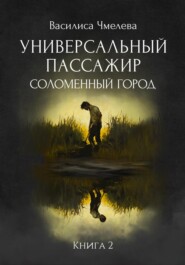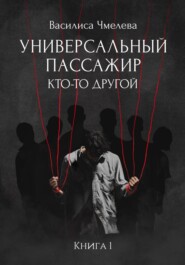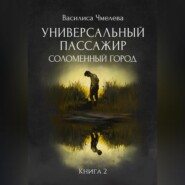По всем вопросам обращайтесь на: info@litportal.ru
(©) 2003-2025.
✖
The Universal Passenger Book 1. Someone Else
Настройки чтения
Размер шрифта
Высота строк
Поля
Next to her, there were duplicates of the girl, only twenty years older. As the girl approached old age, her porcelain skin dulled, and the wrinkles on her face and cup resembled cracks and chips in fine china. The sparkle in her eyes faded, and the saucer in her hands had completely vanished. Now, the elderly woman, broken in places and standing completely naked, embodied the wear and tear of body and spirit. Tea leaves were painted on her cheeks, resembling tears.
“Simply astonishing, isn’t it?” Libby asked, standing to Sophia’s left. “How finely he perceives this world.”
“There’s something to this painting,” the Ephor replied, without much enthusiasm. “As for perceiving the world, people are incapable of seeing the truth, no matter how hard they try.”
Libby looked at Sophia in surprise and rolled her eyes.
“They are the truth, Sophia. Their passion for life is proof of that, don’t you think?”
“Passion—” the Ephor pronounced the word almost with disgust. “What is passion, anyway? Just banal animal instincts, nothing more.”
“Everything is passion on a mental level, just as everything is art. You can find pleasure in creation and even greater ecstasy when your work is accepted and appreciated. The eroticism between people is simple and clear. But what you feel from creativity is something more.”
“His state is borderline. In his creative fervor, Van is mad,” Sophia replied, not turning her head toward her companion.
“But he’s mad just enough to return. Yes, within him lives that dark matter that envelops him, merging with him into a whole and forming what everyone sees – the artist.”
Sophia turned to Libby. Before her stood someone far from the carefree, rosy-cheeked giggler she had imagined. She had become no less mad than her protеgе. A sinister smile mixed with pleasure lingered on her once-adorable face as she eagerly examined the painting.
“By granting Constantin a passion for art, is she robbing him of the possibility of balance?”
“Ladies and gentlemen!” Constantin tapped his glass of whiskey with a glass straw and jumped onto the pedestal, interrupting Sophia’s thoughts. He had no shortage of agility. “I want to thank you all once again for coming today. It means a lot to me to share my work with you. Because what’s the point of drawings if they’re gathering dust in an abandoned factory?”
People applauded appreciatively. Some whistled, while others laughed.
“I certainly hope you’ll look at all the paintings and choose your favorite. But let me begin the presentation with a piece that came to me randomly one night. Therefore, it simply must be first, as the sunset’s orange light filters into the studio.”
Constantin pointed to the very painting of the twins.
The crowd began to chatter and moved closer to the artwork. The Guides also fell silent, contemplating.
“When I was painting this piece,” Van started the backstory, “I initially struggled to reflect an important detail, in my opinion. Under the night’s lamp light, the skin of our heroines shimmered white. Their light hair was also easy to see. But it was only with the arrival of dawn that the truth revealed itself in their gaze.”
Constantin theatrically approached the floor-to-ceiling stained glass windows and pulled back the sheer curtain.
The crowd gasped, and Sophia tensed alongside them. The twins' eyes glowed red. They were no longer the innocent little girls; instead, the painting unveiled them as foreboding Flavuses, cloaked in shadow.
“It looks quite creepy,” someone murmured from the crowd.
“This is amazing! What a play of colors,” another voice breathed out.
In Sophia's mind, the voices blended together, and she could no longer tell whether they were human or from the Guides.
“It feels like I’ve seen them somewhere before.”
She looked down and saw Lukas standing beside her.
“Hello, Lukas,” Sophia mumbled. “What are you doing here?”
“We came here with my mom and dad. Dad’s a collector. He takes us to different exhibitions and galleries all the time,” the boy replied, yawning as usual. “The painting is really beautiful. Maybe Dad will want to buy it —
In the distance, a shriek pierced the air. If people could have heard it, their eardrums would have burst.”
Sophia grimaced and turned to the very twins who had accompanied Lukas at the gas station.
As they swiftly approached the boy, their arms morphed into bat-like wings. They rushed toward him, enveloping him in a cocoon of their wings, their bodies merging into one, transforming them into Siamese twins.
Lukas instantly stopped smiling.
“Should we blame the boy for the fact that one individual's imagination can lead another to ponder? Kallidus is failing in his duties. I need to report how significant even a small breach in the dam can be,” muttered one of the twins.
“And how treacherous the consequences will be when the dam breaks, and a wave of circumstances sweeps over us all,” nodded the other.
“You know, Lukas, I think you’re too young for such a painting,” Sophia told the boy. “It’s more a fabrication from the realm of nightmares than something that carries goodness.”
“Well, thanks,” the twins replied in unison.
“Lorina, just listen to Ephor. Now we’re even a nightmarish vision,” one of them said.
“I think they’re good,” the boy insisted. “If only they were real, we could play together.”
“Edith, our boy can’t be scared so easily. Sometimes he has more courage than it seems. If an ant were to fear a large piece of bread, it would starve to death,” one twin replied.
“Lukas!”
Sophia’s chaotic thoughts were interrupted by a gruff male voice.
“You’ve wandered off again. Your mother and I taught you not to stray too far from us.”
A man in his mid-forties took the boy by the hand.
“But Dad, I loved the painting! I wanted to see it up close.”
“Poor boy,” the father’s guide said, placing a sympathetic hand on his chest. “So many trials for this little body.”
“Kanises are guides resembling elderly people with turtle-like skin, who always empathize with everyone. They are like invisible friends, endowed with boundless wisdom and compassion, evident in their gray, sagging eyes. They provide support to their charges, helping them accept themselves and others as they are. They are sociable, positive old folks. But that's only at first glance.
In the history of the Ephors, there was the first precedent when, in a moment of intense energy hunger, a Kanis revealed itself, becoming an ugly, withered skeleton with skin. Its charge lost their forgetfulness and remembered what their guide looked like during “feeding”. Subsequently, earthly people in Shendit began to mummify the bodies of the deceased to believe in an afterlife, thinking it important to preserve the body for the journey to a higher realm because the soul must remain in its corporeal shell. Funny? The Ephors thought so. However, the Guide was strictly punished for such a transgression and was forever sent to the Higher World. What happened to him afterward remains unknown.”
The elderly woman twirled her owl-shaped amulet on a long chain in her hands. Her long gray hair cascaded down her shoulders in thin strands, while the back was braided into a loose braid. The wind couldn’t affect the Guide, but it seemed her long white shirt dress swayed gently in the breeze, and her cowboy boots tapped playfully on the floor.
She stood beside her charge, gently touching his elbow, and smiled approvingly the entire time.
“Don’t interfere,” Edith’s sharp voice pulled Sophia back to reality. “No need to worry about others' nests like a cuckoo.”
The twins no longer looked like children. Now, two young women stood before her. They still ‘wrapped’ their wings around Lucas but had separated from each other.
“Your son is very brave for his age,” Sophia said to the father, diverting her attention from the guides' bickering. “How old is he, six?”








